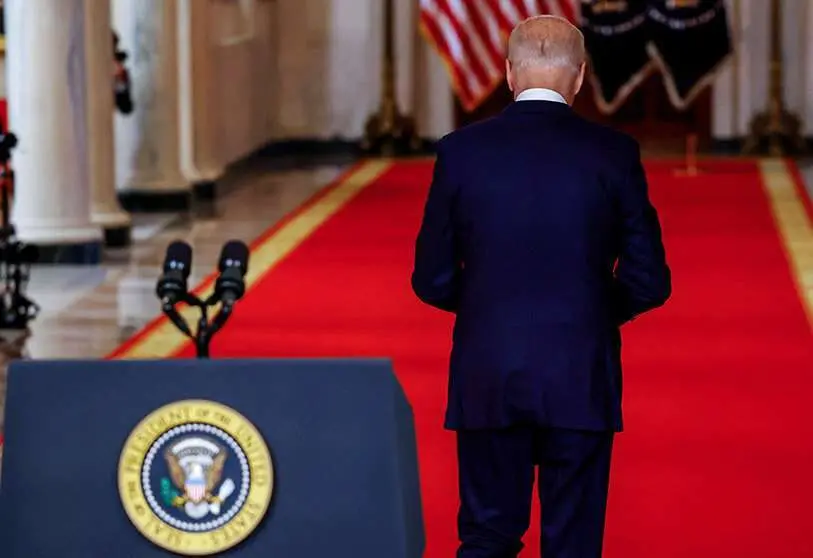United States ends its longest war

Twenty years have passed since the US led a new invasion of Afghanistan under the pretext of supporting democracy in the country and eradicating the Al-Qaeda terrorist threat. The US government, led by George W. Bush, executed the decision after suffering the worst attack in its history: 2,753 people died as a result of the 9/11 attacks, opening a wound in the country that would take years to heal.
Days after the attacks, George W. Bush declared war on terrorism in a speech lasting just seven minutes and under the watchful eye of two houses of Congress. "Those who are not with us will be against us", the former president said at a time when the history of one of the most important conflicts of our century was beginning to be made.
However, this rhetoric has come to an end. The United States is ending its war, leaving Afghanistan under Taliban rule and under the threat of an actor that did not exist when the US decided to execute its mission: Daesh. A few days ago, ISIS-K perpetrated several attacks in the vicinity of Kabul airport, leaving hundreds dead and wounded and creating new scenarios of uncertainty.

Even so, the attacks did not change the US position. The withdrawal of international troops was accelerated and on 31 August, the day set for the official withdrawal of all troops, Kabul airport was a desert.
The withdrawal has now been executed and Biden made a victorious speech noting that "the extraordinary success of this mission was due to the incredible skill, bravery and selfless courage of the United States Army and our diplomats and intelligence professionals".
Referring to the troop withdrawal, Biden justified his move by stating that "this decision on Afghanistan is not just about Afghanistan. It's about ending an era of major military operations to remake other countries".
"We, along with our partners, have airlifted more than 100,000 Afghan citizens, and no one has airlifted citizens like we have," he said. "The US will continue to fight terrorism in Afghanistan and other countries, but it does not want a ground war to do that (...) "We believed that the army of 300,000 that we trained and armed would be a match for the Taliban. We believed that the Afghan government would be able to resist, but this assumption turned out to be wrong".

It also stated that the US "remains committed to expelling the Americans who are in Afghanistan when they wish to do so".
On the other hand, the statements issued by the Taliban delegation differed substantially from the US message: "they have been arrogant from the beginning, now they have been defeated, there will be no revenge and no aggression (...) my first message is that nobody should worry. Stay and live in your homeland and your home, we will protect you".
"They are finally gone and we thank the Taliban for defeating them," said an Afghan citizen on national television.
If one thing is clear from the US decision to withdraw, it is that the United States is changing its foreign policy. Gone are the expansionist discourses, characterised by the discourses of the "manifest destiny" doctrine, or the controversial policy adopted by Bush of "preventive war".

With the Trump era, the United States began to move away from an interventionist foreign policy to pursue diplomatic, contentious and conciliatory measures that put an end to some long-standing conflicts. Trump wanted to reverse the official speeches declared by former presidents to focus on an "American First" domestic policy and move away from the controversial foreign policies surrounding the country.
During his 2016 campaign, Trump promised to withdraw troops from Afghanistan and Iraq, and once in office his promise began to take the first steps towards being realised. With the arrival of Biden to power, the US president announced last April the withdrawal of troops before 11 September this year: "I am the fourth president of the United States to have to deal with the presence of US troops in Afghanistan. Two Republicans, two Democrats. I will not pass this responsibility to a fifth," he said.

He then concluded that "it is time to end America's longest war. It is time for American troops to come home (...) We cannot continue the cycle of extending or expanding our military presence in Afghanistan in the hope of creating the ideal conditions for our withdrawal, hoping for a different outcome".
Four months later, the withdrawal is now complete. The US is leaving behind a war that has cost the country $778 billion. Clearly, the loss has transcended economic losses, as coalition forces have suffered 3,500 casualties, of which more than 2,300 were US troops. If we add to this the deaths and injuries of both Afghan military and civilians, the figures rise to almost 111,000, according to the United Nations Assistance Mission in Afghanistan.

The United States is leaving Afghanistan, leaving the country in a similar situation to the one it found itself in almost twenty years ago, but now it has the threat of China and Russia which, taking advantage of the Western vacuum, are not hesitating to make moves on a damaged chessboard. To this must be added the Taliban power that has tried to demonstrate its control of the situation, but the latest ISIS-K attacks show that the threats to the country's security are latent. After the emergence of China, its increasing influence in the region, the resurgence of Daesh in the conflicts and the change in US strategy, we can see that the new geopolitics is changing the rules of the global game in this region of the world, and the United States no longer wants to be part of it, at least in a direct way.










